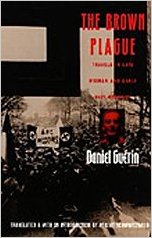I’m reading Daniel Guérin’s The Brown Plague: Travels in Late Weimar and Early Nazi Germany (Duke University Press, 1994), based on the French journalist’s trips through Germany in the early 1930s. Guérin was then a young leftist whose thinking later evolved in a communist-anarchist direction. Germany both attracted and appalled him with its extremist politics.
From the Publisher’s Weekly review:
“Guerin’s comments on Communists and Social Democrats point to a connection between far left and far right. Not only did the Communist leadership come to see ‘Nazism as a necessary transitional stage on the road to proletarian dictatorship’ but Guerin’s evidence suggests that workers steeped in the virulent anticapitalism and revolutionary struggle of Communists were ripe for the anti-Semitism and bloody chauvinism of the Nazis.”
I’m struck by the relevance of the “ripeness” to our Alt-Left/Alt-Right dynamic, wherein the same psychologies and social confusions are in flux: Who is a real “fascist”? And who is a true “antifascist” They often seem indistinguishable. It confirms Friedrich Hayek’s observation and warning about the 1930s:
“Many a university teacher during the 1930’s has seen English and American students return from the Continent uncertain whether they were communists or Nazis and certain only that they hated Western liberal civilization.”[1]
Also interesting is that Guérin was gay but closeted for much of his life, in part because of general attitudes toward homosexuality in France at the time — but especially because he feared the backlash from his puritanical fellow Leftists.
“After coming out in 1965, Guérin was abandoned by the Left, and his papers on sexual liberation were censored or refused publication in left-wing journals.”[2]
Sources.
[1] Hayek, The Road to Serfdom (1944, p. 34).
[2] According to David Berry (2003). For a dialectic of homosexuality and revolution. Paper for “Conference on “Socialism and Sexuality. Past and present of radical sexual politics,” Amsterdam, 3–4 October 2003. Cited here.
